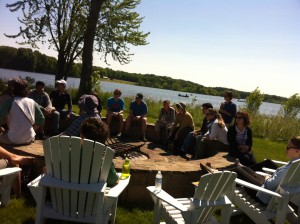By Muaaz Ahmed
This reflection was originally posted here, for the UCL Institute for Sustainable Resources.
—-
Arriving at the Turkey Run State Park in Indiana at the beginning of the course, we were asked to pick a single object that would reflect what we want to take away from the week…by the end of the week I realised I had learnt and taken far more from the experience than I could ever have anticipated. The week made me re-think what I wanted to achieve ,what I could achieve, and more importantly, how that should affect me here and now: ‘put yourself in the place of most potential’ is a piece of advice I heard during the week and one that, for me, puts everything in perspective.
From the beginning, an emphasis was placed on building a togetherness and sense of community among the participants, and very quickly I felt part of an extraordinary group, I have never been among a more inspiring and visionary group of people. Early on in the week were sessions around values and place, these especially were a great reminder for me, we don’t often get time to stop and think about it but these two themes define us, and represent what we can be; where we are today and where we want to be, and what we believe in. One of the thirteen themes of Byron that I felt was particularly pertinent for myself (and probably for most students) is that of vocation, and thinking about a future career path with the bigger picture in mind: one’s values and a long-term vision. Being mindful of that long-term vision not only serves as an aim but it also adds structure and provides motivation, a great quote that puts this into context for me is: “Do all your work as though you had a thousand years to live; and as you would if you knew you must die tomorrow.”
Issues of resource use and sustainability were brought into sharpest focus for me during visits to two farms: a modern production farm with GM crops and fertilisers abound and an organic Amish farm. The contrast was remarkable, the visit to the Amish farm brought a fascinating perspective on modern day living;that both farms co-existed as neighbours was a reminder not just that there are many routes to a more sustainable world but also that diversity is a fundamental part of that. The Fellowship was particular about the language used to discuss sustainability, much of the dialogue around sustainability today is about saying ‘don’t do this’ and ‘stop that’, however what is far more effective in inspiring change is positive language: discussing what can be done rather than what can’t be done, “dwell in possibility”. This simple change in language makes sustainability in all senses of the word a far more useful and interesting conversation to have.
Sustainability is virtually impossible to define as it means such different things to different people and, although a fundamental part of the course, the Fellowship never sought to define the term. Indeed, the Fellowship embraced the diversity that this brought and encouraged us to develop our perspectives into visions for the world. The culmination of the week came on the final day during the Possibility World Café, when we discussed our visions with fellow participants, mentors and alumni of the Fellowship to build these into plans of action. So I end by encouraging you all to develop your vision and begin realising it now, as the Fellowship did, by emphasising to you that you are in the right place and this is the right time to make it happen.

